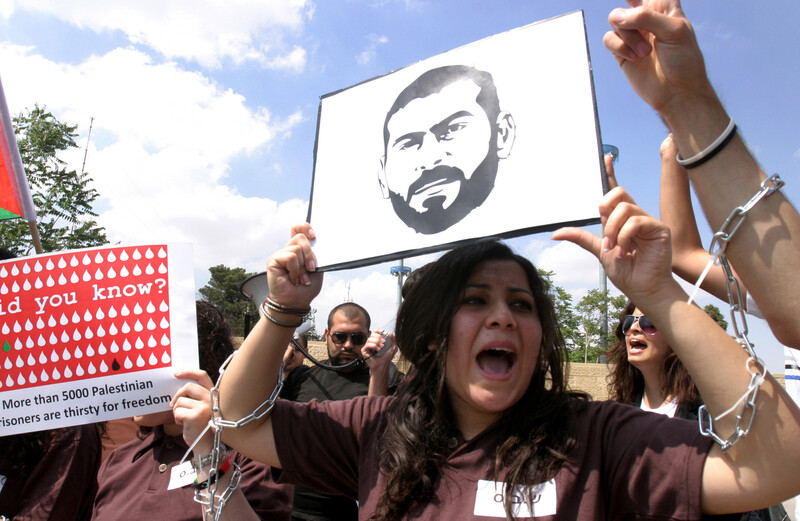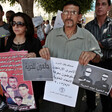The Electronic Intifada 18 May 2012

The Israeli government could not have contained the outrage had any hunger striking prisoner died.
APA imagesIsraeli government spokesman Mark Regev would have us believe that Israel willingly and graciously conceded the demands of 2,000 hunger-striking Palestinian prisoners in the name of peace, and as an act of good faith towards Palestinian Authority president Mahmoud Abbas. But neither Abbas nor the Israeli government could have contained the ensuing uproar had any of the prisoners died.
It was only in the last 10 days of the month-long mass hunger strike (four prisoners had passed the 70-day mark, seven had passed 50 days) that it gained visible media coverage. Israeli officials were quick to invoke security grounds.
In a interview with CNN on 7 May, Regev said: “These groups have put suicide on a pedestal and now I’m afraid they’ll kill themselves to instigate more violence.”
“These groups” are Palestinians, young and old, from an array of different backgrounds, arrested from their homes and at checkpoints: students, sportsmen, engineers, journalists, health workers. For weeks they fasted, their flesh consumed by their own bodies, nervous systems shutting down, organs giving way. They were denied family visits, placed in solitary confinement, some reportedly beaten in prison hospital, emaciated limbs shackled to their beds, teetering on the brink of death.
A struggle reduced by Regev to a ploy meant to instigate reprisal.
The Israeli Prison Service eventually approved the prisoners demands — basic rights they were owed under international law and conventions — including an end to the policy of administrative detention, ending solitary confinement, and allowing family visits.
Israel’s “Guantanamo Bay” policies
This hard-won victory however, is only the tip of the iceberg. The deeper issue of contention lies in the adjudication process employed by Israeli forces towards Palestinian prisoners, which mirrors that of the US State Department toward Guantanamo Bay detainees.
Under Military Order 378, the Israeli military courts are granted extraordinary powers over Palestinians in the occupied West Bank and Gaza Strip and even outside them, criminalizing many aspects of ordinary life. Basic guarantees for due process and a fair trial, the right to call witnesses and not to self-incriminate, required by international law are absent, and a detainee is effectively deemed guilty unless proven innocent — in a system with a near 100 percent conviction rate. These and many other documented abuses are in no way exceptional. They are the norm in a system where all the judges and prosecutors are officers of the Israeli army and all the defendants are Palestinians (see “Presumed Guilty: Failures of the Israeli Military Court System: An International Law Perspective,” Addameer, November 2009).
Those are issues that concern Palestinians who are actually “charged” and “tried.” On top of this there are the hundreds of so-called “administrative detainees,” who are held without charge or trial based on “secret evidence” which is kept from the detainees and their lawyers.
Israel moreover refuses to recognize Palestinians as prisoners of war, denying them the protection of the Third Geneva Convention, to which Israel is a signatory, while in some cases using the “Unlawful Combatant law” to detain Palestinians indefinitely under administrative detention.
This follows the example of George W. Bush, who afforded the legal status of “Illegal Enemy Combatants” to Guantanamo Bay detainees.
And lastly, thousands of cases of torture, using internationally banned methods, have been recorded by Palestinian, Israeli and international human right organizations over the years.
This includes sleep and sensory deprivation, subjection to extreme heat and cold, food and drink deprivation, solitary confinement that can last for years, various forms of physical suffering including breaking bones and electrocution, sexual assault, and strappado, a medieval technique revived by Israeli security agents, known as “Palestinian security hanging” in modern day terms. This method involves tying detainees’ hands behind their backs and hanging them from their bound hands for hours or even days, causing excruciating pain, dislocated joints and the feeling that their body is being pulled apart.
Systematic violations of Palestinian rights
Nearly two hundred] Palestinian prisoners have died in Israeli jails since 1967 due to torture and mistreatment, an average of approximately four prisoners each year. Thousands have suffered illness and debilitation over the years (“On the occasion of Palestinian Prisoners’ Day, PCHR issues a report on Palestinian prisoners in Israeli jails,” PCHR, 17 April 2006).
Systematic violations of Palestinian prisoners’ rights have been explained away in the past in the same way as they were during the hunger strike. Again, Mark Regev was quoted by the Associated Press as saying:
“This strike is being led by hardcore Hamas and Islamic Jihad, the leaders of this strike are people who’ve been directly responsible for brutal acts of terror against innocent civilians, people who have blown up people in pizza parlors, in coffee shops, on school buses.”
What a characteristically misleading statement. In reality only 5 percent of indictments of Palestinians in Israeli courts are for causing or attempting to cause death — less than the percentage of indictments of Palestinian prisoners for traffic offences (incidentally, many of which are treated as threats to Israeli security according to military order 378, Section VI) (“Presumed Guilty: Failures of the Israeli military court system (Page 9), Addameer, November 2009).
Another Israeli prime minister spokesperson, Ofir Gendelman, stated on Twitter: “6 of the 1600 prisoners on hunger strike are administrative detainees, the rest were tried and convicted of terrorism.”
Also a misleading statement, taking into account the nature of terrorism offenses as defined by Israeli military orders, which constitute Israel’s legal basis for its control over the West Bank and Gaza Strip.
Israel has drafted numerous military orders pertaining to the detention and prosecution of Palestinian prisoners.
For example, military order 101 states that attending protests, waving flags without a permit, sitting in a cafe if the Israeli military commander has ordered it closed, displaying political symbols, printing and distributing material “of political significance,” assembly of ten or more Palestinian political characters without a permit from Israel, and attempting to influence political opinion (deemed political incitement), are some of the offenses considered “Hostile Terrorist Activity.”
Political parties, those under the Palestine Liberation Organization, with which Israel signed a peace deal in 1993, and others, are illegal. It is an act of terror to associate with members of “illegal” parties. It is illegal to invite them into your home, be present at their functions, be in possession of their literature, et cetera. Israel currently holds 27 democratically-elected Palestinian members of parliament in administrative detention, among thousands of activists and political figures.
Section 3 of military order 378 criminalizes affiliation to any group any of whose members committed or plans to commit a security offense. Moreover, so much as talking to someone Israel merely suspects could be its enemy, immediate relatives included, is a crime.
Another clause states that an Israeli soldier can order any townsperson or villager to remove obstructions in the road, including nails and glass. It is a criminal offense to refuse.
This order also allows Israel to prosecute Palestinians who commit offenses inside the West Bank and Gaza Strip..
Military order 1650, among other things, criminalizes what is defined as “infiltration,” which includes the presence of Palestinians from the Gaza Strip in the West Bank without an Israeli-issued permit, including those born in the West Bank but have a registered address in Gaza. The culprit can face up to twenty years in jail.
Given the wide range of Palestinian political, civic, cultural and social activities criminalized by Israeli military orders, it makes sense that 90 percent out of all Palestinian prisoners who are charged are convicted.
No longer going unnoticed
In his CNN interview, Israeli spokesperson Mark Regev said, “Israel gives our prisoners treatment above and beyond what international standards demands we give, if you look at some of their demands it is really for the extras above and beyond what international law requires.”
This statement bears no semblance to the truth. Denial of the appalling conditions of imprisonment endured by Palestinians, and reported by organizations such as the International Committee of the Red Cross, raises doubts concerning Israel’s commitment to improving these conditions as stipulated by the prisoners’ agreement.
Israel’s military “justice” system further propagates the definition of what Palestinian right should be, according to parameters and rhetoric that have proved time and again to be fabricated and no longer relevant.
Lucky enough, Israel’s unjust treatment of Palestinian prisoners is no longer going unnoticed.
Safa Joudeh is a freelance broadcast journalist and writer from the Gaza Strip, reporting from Gaza and Egypt. Follow her on Twitter (@SafaJoudeh).





